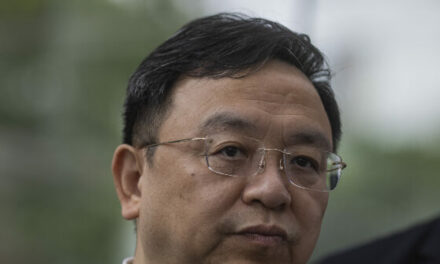We support our Publishers and Content Creators. You can view this story on their website by CLICKING HERE.

Syrian insurgent leader Ahmed al-Sharaa, formerly known as Abu Mohammed al-Jolani when he was a high-ranking al-Qaeda member, on Sunday repeated his promise that the new Syria would be inclusive and respectful of minority groups.
Sharaa promised a “new era far removed from sectarianism” after meeting with Druze leader Walid Jumblatt on Sunday.
“We take pride in our culture, our religion and our Islam. Being part of the Islamic environment does not mean the exclusion of other sects. On the contrary, it is our duty to protect them,” Sharaa said.
The insurgent leader also pledged that Syria will no longer exert “negative influence” over Lebanon and will instead respect its neighbor’s “sovereignty, the unity of its territories, the independence of its decisions, and its security stability.”
“Lebanon needs a strong economy and political stability that Syria will support,” Sharaa said, asking the Lebanese to “erase from their memory the legacy of the old Syria.”
“This is a new chapter with all components of the Lebanese people, regardless of previous stances,” he promised.
Syria has been exerting “negative influence” over Lebanon throughout most of the fifty-year Assad dynasty, which ended on December 8 when Sharaa’s Hayat Tahrir al-Sham (HTS) jihadi group stormed into Damascus and drove dictator Bashar Assad into exile.
Syria has provided a pipeline for Iranian weapons to reach the Hezbollah terrorists of Lebanon, and the bloody chaos of the Syrian civil war that began in 2011 spilled across the border, creating a massive refugee crisis for the Lebanese.
The Assad regime assassinated several key figures in Lebanon over the years to preserve its malign influence, including Walid Jumblatt’s father Kamal, who was ambushed by gunmen in 1977. Walid believes his father’s death was ordered by Hafez al-Assad, father of Bashar.
HTS began as an offshoot of al-Qaeda, originally known as the Nusra Front in Syria. Sharaa has lately been trying to rehabilitate the image of his group and recast it as a “moderate” Islamist force, Promising to respect minority rights, staying out of Lebanon, and backing away from confrontations with Israel are three of the most important pledges Sharaa has made to build diplomatic credibility with the Western world.
The Druze are a religious minority in both Lebanon and Syria. In 2015, at least 20 Druze were massacred by HTS, back when it was known as the Nusra Front. The Druze were killed for resisting HTS attempting to seize the home of a Druze who was allegedly sympathetic to the Assad regime.
Walid Jumblatt, who led the first delegation of Lebanese politicians and religious leaders to meet with Syria’s new rulers, appeared willing to believe that Sharaa and HTS have turned over a new leaf, and relations between Syria and Lebanon might soon “return to normal.”
“We salute the Syrian people for their great victories and we salute you for your battle that you waged to get rid of oppression and tyranny that lasted over 50 years,” Jumblatt said.
“We hope that Lebanese-Syrian relations will return through the embassies and that all of those who committed crimes against the Lebanese will be held accountable. We also hope that fair trials will be held for all those who committed crimes against the Syrian people,” he said.
Jordan and Qatar also sent delegations to Damascus this weekend for meetings with Sharaa.
“We want a stable, secure, safe Syria that guarantees the rights of its people through a transitional process consistent with the aspirations of Syrian people,” said Jordanian Foreign Minister Ayman Safadi.

 Conservative
Conservative  Search
Search Trending
Trending Current News
Current News 







